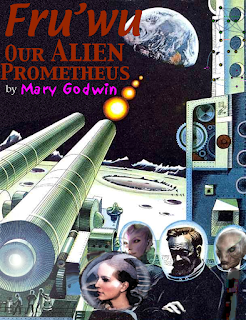 |
| "The night when Mary Shelley, Lord Byron and their cohorts gathered together at Lake Geneva to tell ghost stories." (BBC) |
 |
| A Storm in the Stars |
That dismal summer of 1816, Mary's party had been gathering near a fireplace to read stories about "apparitions of spectres, revenants, phantoms" and Mary took up the challenge to write her own horror story founded upon a "supernatural occurrence".
Supernatural Occurrence
 |
| "the golem ... has served as inspiration for such varied figures as Mary Shelley’s monster in her novel Frankenstein [and] a frightening character in the television series The X-Files" |
Many interpretations of the Frankenstein story accept a technical absurdity: that Mr. Frankenstein, working in the back room of his house, some time in the 1700s, made some sort of deep scientific discovery that suddenly allowed him to bring to life an artificial being that had been constructed from an assortment of materials obtained from the "dissecting room and the slaughter-house". Traveling further down that fantastic interpretive path, we must assume that this new-born artificial life form was able to go out into the wild, survive, learn to think, read and speak and then magically track down and torment Frankenstein and his family in some crazed attempt to have a complementary female creature manufactured to serve as its mate and the foundation of a new species.
 |
| the living dead |
 |
| the horror! |
 |
| The Rossi Intervention |
Dealing with the unintended deleterious consequences of technology has always been part of human existence. Global warming provides a good example.
Just follow the money. We've watched while people who make a living selling fossil fuels spend decades denying the scientifically predictable consequences of rising atmospheric carbon dioxide levels. Many politicians refuse to make sensible laws such as imposing a carbon tax. Rather than work to fix the global warming problem, we have "environmental activists" who irrationally fear gene modified foods.
 |
| Fru'wu: Our Alien Prometheus |
For me, Frankenstein is a lame (almost unreadable) horror story that feels cobbled together from dead and lifeless textual fragments. The major character (Victor Frankenstein) is not animated as a convincing depiction of a scientist. The mention of science and chemistry in the early part of the story leads us nowhere and that tentative, promising thread is abandoned early. To play the science fiction game, an author has to try to write a story that can entertain a scientifically literate audience. In my view, Frankenstein is anti-science fiction, possibly classifiable as cynical capitalistic exploitation of ancient religious mythology and some people's morbid fascination with psychotic serial murderers.
 |
| Professor Skyriotus |
What if a real science fiction story had actually been written in 1816? In our Reality, science fiction did not come into existence as a specialized literary genre until the 20th century. However, in an alternate Reality, the science fiction genre might have been started sooner. As my 2016 tribute to Frankenstein, I've begun to record my imagined version of the first science fiction story in the Ekcolir Reality.
Next: fun with a reasoning robot
 |
visit the Gallery of Book and Magazine Covers |
 |
| Shelley Bot |
More evidence that the story of Frankenstein has taken on a life of its own: Shelley Bot.

No comments:
Post a Comment